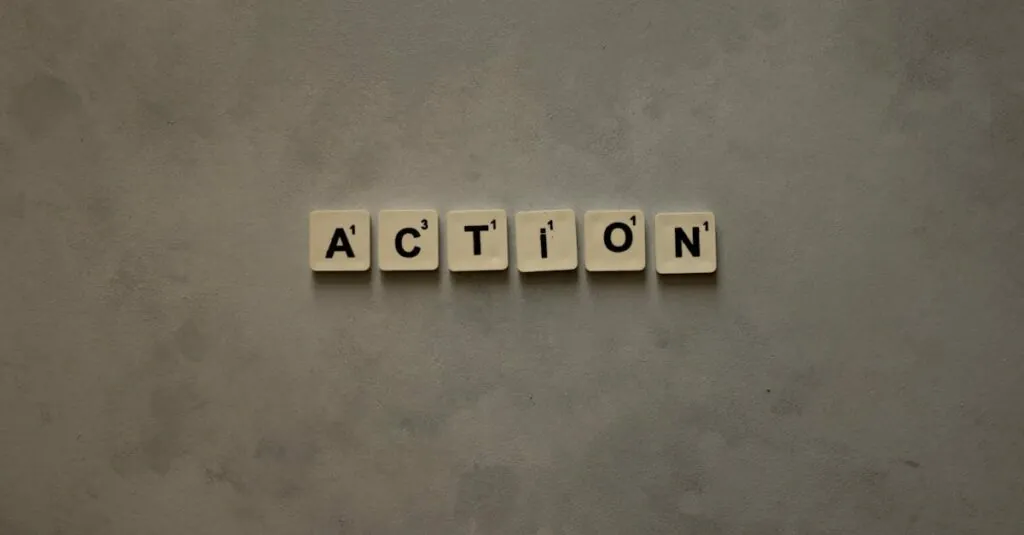In a world where innovation reigns supreme, creative thinking courses are the secret sauce to unlocking untapped potential. Picture this: your brain is a treasure chest, and these courses are the key that opens it. Whether you’re an aspiring artist or a corporate warrior, the ability to think creatively can transform mundane tasks into masterpieces.
Table of Contents
ToggleOverview of Creative Thinking Courses
Creative thinking courses offer structured approaches to enhance problem-solving and innovation skills. These courses often include various methods and techniques, helping participants unlock their creative potential. Through exercises and practical applications, students learn to view challenges from multiple perspectives, allowing for new solutions to emerge.
Formats of creative thinking courses vary widely. Online modules provide flexibility, enabling individuals to learn at their own pace. In-person workshops encourage collaboration, leading to valuable networking opportunities among participants. Both formats cater to diverse learning styles, making them accessible to everyone.
Topics covered in these courses include brainstorming, mind mapping, and lateral thinking. Participants practice these techniques in real-world scenarios, increasing their efficacy. Engaging with tools like design thinking reinforces the application of creativity in business contexts.
Success stories frequently emerge from individuals who complete these courses. A marketing professional may revamp campaigns by applying creative concepts, while a teacher could implement innovative methods in classrooms. Testimonials often highlight the transformative impact these courses have on personal and professional growth.
Many institutions and organizations offer certification for completing creative thinking courses. Credentials often enhance one’s resume, showcasing commitment to continuous learning. This certification can also provide a competitive edge in today’s job market, where creativity is highly valued among employers.
Benefits of Creative Thinking Courses
Creative thinking courses provide substantial benefits for individuals across various fields. Participants gain the ability to tackle complex problems and develop innovative solutions, enhancing their overall effectiveness.
Enhanced Problem-Solving Skills
Creative thinking courses foster improved problem-solving skills. Participants learn techniques that enable them to approach issues from different angles. New perspectives often lead to unique solutions. Skills such as brainstorming and mind mapping help in breaking down problems effectively. Students apply these methods to real-world challenges, translating theory into practical use. The engagement with diverse thought processes sharpens analytical thinking and decision-making.
Improved Innovation and Creativity
Innovation and creativity experience significant growth through these courses. Participants explore various techniques that stimulate original ideas and enhance creative capabilities. Engaging in collaborative workshops allows for the exchange of ideas and constructive feedback. Exposure to lateral thinking techniques encourages thinking outside conventional boundaries. As individuals practice applying creative principles in their work, they often find novel approaches that elevate their projects. Over time, these skills contribute to greater adaptability and versatility in a rapidly changing job market.
Types of Creative Thinking Courses
Creative thinking courses come in various formats, designed to suit different learning preferences and needs. They help participants engage with their creativity through diverse methodologies.
Online vs. In-Person Courses
Online courses offer flexibility, allowing individuals to access materials from anywhere at their convenience. These become ideal for busy professionals who prefer to learn on their schedule. In-person courses provide face-to-face interaction, fostering collaboration and immediate feedback among participants. Engaging with peers and instructors enhances the learning experience, offering opportunities for networking and building relationships. Both formats cater to different learning styles, ensuring that everyone finds a course that aligns with their preferences.
Short-Term Workshops vs. Long-Term Programs
Short-term workshops focus on intensive sessions that cover specific topics, providing quick bursts of creative insight. They allow participants to dive into subjects like brainstorming techniques or mind mapping without a long-term commitment. Long-term programs span several weeks or months, offering comprehensive curricula that build foundational skills over time. These programs encourage the development of deeper thinking strategies through sustained practice and application. Participants benefit from ongoing support and guidance, creating a rich learning environment that fosters substantial growth.
Key Features to Look for in a Course
Finding the right creative thinking course involves evaluating several key features. These elements ensure that participants gain the most beneficial experience.
Course Curriculum and Structure
An effective curriculum emphasizes both theory and practical application. Courses should blend techniques like brainstorming and mind mapping, allowing learners to practice skills in real-world scenarios. Inclusion of diverse methods caters to different learning styles and preferences. Structured modules promote a progressive learning experience, facilitating skill mastery. Flexibility in course delivery, whether through online or in-person formats, accommodates varying schedules.
Qualifications of Instructors
Instructors play a crucial role in the learning experience. Experienced educators bring valuable insights and real-world examples to the course. Look for instructors with a strong background in creative thinking, psychology, or related fields. Their expertise enhances the quality of instruction and guidance. Certifications or practical achievements in fostering creativity add credibility. Engaging instructors will inspire students and nurture an open learning environment.
Creative thinking courses offer invaluable tools for anyone looking to enhance their problem-solving abilities and innovate in their field. By engaging with diverse learning formats and techniques, participants can unlock their creative potential and transform their approach to challenges.
With the right course, individuals can gain not only practical skills but also the confidence to think outside the box. This commitment to creativity can lead to remarkable achievements in both personal and professional realms. As the demand for innovative thinkers continues to grow, investing in creative thinking courses becomes a strategic move toward success.






